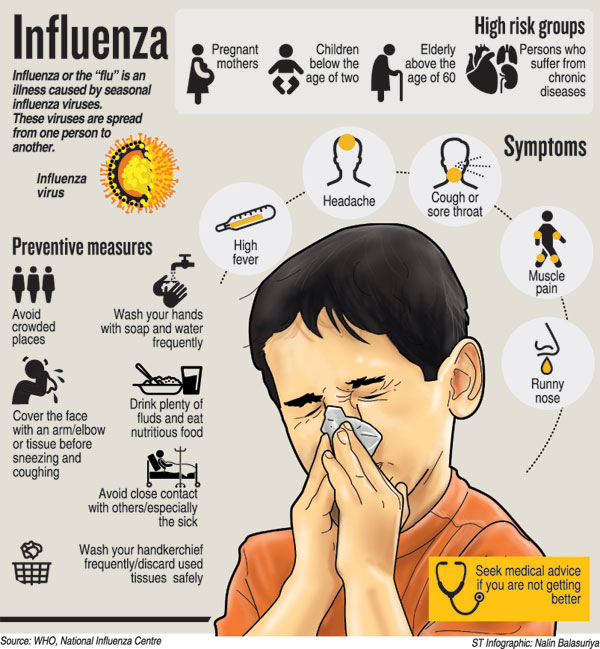Flu is in the air

It is the season of flu and a few basic precautions will ensure that you will not fall victim to this illness.
Wash your hands with soap and water often
Don’t touch your face, particularly your eyes, nose and mouth
These are the simple measures that Consultant Respiratory Physician Dr. Amitha Fernando attached to the National Hospital of Sri Lanka (NHSL) puts forward as a preventive against influenza or flu, an acute respiratory illness caused by influenza viruses.
If, however, you have caught the bug, he advises that you should not sneeze or cough into other people’s faces as that would be a sure way of spreading this very infectious virus.

Dr. Amitha Fernando
Then the measures needed are:
Follow sneeze and cough etiquette – sneeze or cough into the crook of your arm.
Use disposable tissues, rather than a handkerchief, to wipe your nose and dump these tissues in the waste-bin after use without leaving them lying around.
Wash your hands frequently as otherwise you will be a source of infection because whenever you touch anything such as pens, pencils, door-knobs and telephones you will leave behind loads of viruses unseen to the naked eye on these items.
Dr. Fernando says that the symptoms of the flu include:
Runny and stuffy nose and sore throat
Upper airway and nasal congestion – simply put your nose and throat area would be congested
Headache
Body aches
High fever
Malaise and lethargy – a general feeling of being ill and a lack of energy
Children particularly may stop eating or feeding
“It is usually a self-limiting illness,” says Dr. Fernando, pointing out that rest and keeping yourself hydrated with lots of warm liquids such as soup, tea and water would help in the recovery.
If you are unwell, do not go to work and if your children are unwell do not send them to school, is his advice.
MediScene gets an in-depth look at what influenza is all about from the Head of the National Influenza Centre and Consultant Medical Virologist Dr. Jude Jayamaha of the Medical Research Institute (MRI) in Borella.
“Currently, Influenza B is what is showing predominance, while Influenza A is also around,” he says, pointing out that influenza has two distinct seasons or a bi-modal seasonal pattern.
Active surveillance by the National Influenza Centre indicates that the two seasons are November-December-January-February and April-June-July, with a very clear link to the monsoon rains, MediScene learns.

Dr. Jude Jayamaha
Comparing Influenza B and A to see-saw action, Dr. Jayamaha explains that one is dominant at one time and the other the next time. But no side of the see-saw ever touches the ground, which means that the other virus which is not dominant is also around. Strong routine surveillance and clinical samples show that the predominant virus is Influenza B currently. All these conclusions have been drawn through real-time PCR testing.
The incubation period (the period between exposure to an infection, in this case the virus, and the appearance of the first symptoms) is about 1 to 4 days, while generally a person will feel ill for about 2 to 6 days or a maximum of about one week. This, however, would vary from person to person. The convalescence period during which the body aches and malaise will persist would last around another week.
The high-risk groups are:
Pregnant women
Children below two years of age
The elderly
Those with long-term lung and heart disease
Those with diabetes and neurological illnesses
Those with weakened immune systems or those on immune-suppressant medications such as people who have undergone transplants or are suffering from cancer
While Dr. Jayamaha urges those who are in these vulnerable groups especially expectant mothers to seek immediate medical help, Dr. Fernando advises those with underlying respiratory conditions including asthma, Chronic Obstructive Pulmonary Disease (COPD) and bronchiectasis to do the same.
In asthma, the airways narrow and swell and produce extra mucus, while in COPD, a common lung disease which makes it difficult to breathe, there is chronic bronchitis involving a long-term cough with mucus, emphysema involving damage to the lungs over time or a combination of both. Bronchiectasis, meanwhile, is a long-term illness where the airways of the lungs become abnormally widened, leading to a build-up of excess mucus.
Picking up treatment, Dr. Jayamaha says that usually the flu, whether suspected or confirmed through laboratory testing, can be managed with adequate rest and proper nutrition including lots of fluids.

The anti-flu medication in tablet form, oseltamivir, should be prescribed only if a patient’s condition deteriorates and that too should be after admission to hospital.
Dr. Fernando adds that what doctors need to watch out for in the case of influenza is complications of viral pneumonia as well as any secondary bacterial infections that could follow the initial viral condition.
There is a trivalent vaccine against the flu, which gives cover for AH1, AH3 and Influenza B, says Dr. Jayamaha, stressing, however, that it cannot be compared to the vaccine shots for mumps, measles and rubella (MMR) or varicella.
He says, “The flu vaccine, administered as an injection, is unique but the efficacy ranges from 44-78% and if there is a good match the efficacy can even go beyond that. Globally, each year, the World Health Organization (WHO) conducts active surveillance and predicts what the next seasonal flu would be, whether Influenza A or B. If there is a good match, then the vaccine efficacy could even be as much as 90%.”
However, Dr. Jayamaha, cautions that the influenza virus is subject to rapid mutation or change. It is notorious in this connection, as it changes when circulating annually. This is why people need to get their flu-shots every year.
“Yes, the vaccine is registered in Sri Lanka but there is little awareness about it,” he adds.


